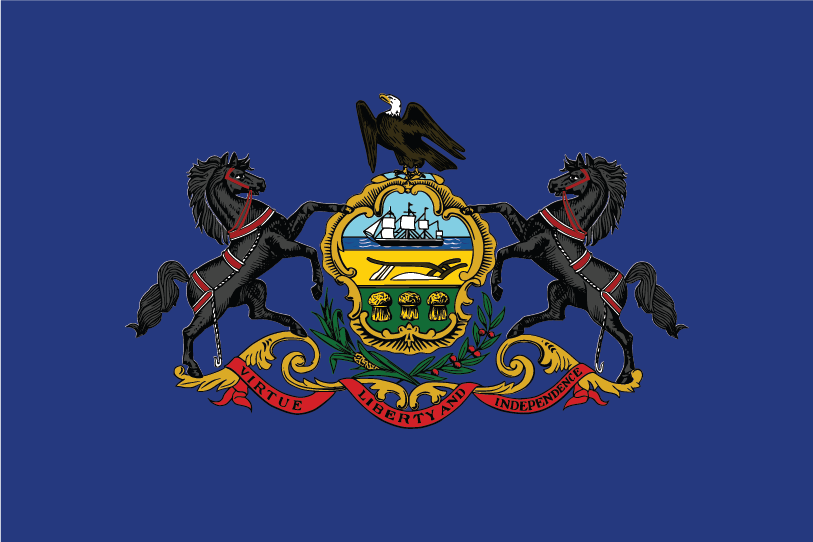Table of Contents
- Facts About Pennsylvania
- How To Qualify for SSDI in Pennsylvania
- How To Apply for SSDI in Pennsylvania
- How To Appeal a Denial in Pennsylvania
- More Pennsylvania Benefits
- How Do Short-Term Benefits in Pennsylvania Work?
- Pennsylvania Social Security Offices
- Pennsylvania Hearing and Appeal Offices
- Pennsylvania Disability Insurance Benefits
Pennsylvanians who cannot work because of a medical condition may be eligible to receive Social Security Disability Insurance (SSDI) or Supplemental Security Income (SSI) to help meet their basic financial needs.
In addition to these two programs, Pennsylvania offers other programs to assist low-income workers and disabled adults.
Facts About Pennsylvania
In Pennsylvania, 23.9% of adults have a disability that prevents them from working. The largest age group of adults on disability are 65 or older. While several disabilities prevent adults from working, the two main categories in Pennsylvania are mobility disabilities and cognitive disabilities.
Pennsylvania has several disability benefits programs to care for the medical needs of disabled adults. This focus on wellness is likely because disabled Pennsylvanians are twice as likely to be inactive. Additionally, 32.3% of disabled adults are smokers, and 42.3% are obese, both higher than the national average.
How To Qualify for SSDI in Pennsylvania
To qualify for SSDI in Pennsylvania, the applicant must be a worker, a widow of a worker, or an adult child of a worker and have a medical disability that makes it impossible to work. This medical condition must have lasted for at least one year, will last for at least one year, or likely cause the individual’s death. For children, the medical condition must severely reduce their ability to function and for the same duration as mentioned above.
Your disability must prevent you from working entirely. You cannot work part-time or in temporary status and receive Social Security disability benefits. But you must have worked for a qualifying number of years and paid social security taxes in recent years before your injury or illness.
If you can still work, but at a severely reduced amount, you may qualify for SSI which aids senior citizens and disabled workers with little or no income.
How To Apply for SSDI in Pennsylvania
There are a few ways to apply for SSDI in Pennsylvania: online, at your local Social Security office, or by calling 1-800-772-1213. You will need to fill out the Form SSA-16 application and submit medical records and other supporting documentation.
The online system is the fastest and most convenient way to apply. Be sure to gather all required documents and information before beginning the application and plan to complete it in one to two hours.
The application contains four parts:
- Background Information
- Disability Information
- Sign a Medical Release
- Confirm Application Submission
After completing the background information section, the system will provide you with a Re-entry Number, your PIN, to get back into your application should you need to save and finish later. After completing the application and submitting it, be sure to print your confirmation page for your records.
If you need someone to help you to complete the application, you can do so. The helper does not have to be an officially appointed representative, but if you would like to set that up, you can do so through a Form SSA-1696-64. You will need to initiate the claim and sign it, but if you can’t do it online or are not present with your helper, the SSA will mail you the application to sign.
Here is a list of documentation you may need to complete your application for disability benefits. The Social Security representative will need to see the original document, but you can submit copies with the disability claim and keep your originals.
- Social Security Card and Birth Certificate
- Contact information for all doctors with treatment dates
- Current medication list
- Medical records
- X-rays, test results, labs
- Work information from past 15 years (supervisors contact information and job duties)
- Tax documents (W2s, tax return) from the previous year
- Prior marriage dates
- Bank information for direct deposit
- Injury documents such as workers compensation documents, if applicable
After your application for Social Security disability benefits is submitted, the SSA will validate your basic eligibility. Next, your application will go through a medical review to determine whether your documented disability prevents you from working. Factors considered are information about your condition, such as when it started, what treatments you have had, how it limits you, and your progress. You might need to attend other exams or tests, but they will be at no cost to you and administered by a Social Security contracted agency.
Once the SSA has made its decision, they will notify you in writing.
How To Appeal a Denial in Pennsylvania
If your application for SSDI benefits is denied, you have the right to appeal through a social security disability hearing. The Office of Disability Adjudication and Review will schedule your hearing for an Administrative Law Judge to review your case for reconsideration.
You will present any new evidence and can give your testimony and statements from witnesses. Hearings occur in person at one of many local hearing offices, or you can attend the hearing through a teleconference. An attorney is authorized to represent you. You may want to consult a social security disability lawyer to help you through the process because of their experience and knowledge with SSD benefits claims.
The deadline to request an appeal is 60 days from the day you received your disability determination letter. Written requests should be sent to your local field office or the address indicated on your decision letter.
More Pennsylvania Benefits
Pennsylvania offers benefits and services other than Social Security disability benefits to help workers who need assistance due to lack of work. Although the application process may be similar, each benefit has specific eligibility criteria and application procedures.
SSI
Supplemental Security Income (SSI) is a program that provides financial assistance to senior citizens and disabled persons with little or no income. SSI is funded by general taxes and not directly from Social Security taxes. Its purpose is to meet basic needs such as food, clothing, and shelter.
To qualify for SSI, you must have limited income and assets. The application process and documents required are like the SSDI process. And like SSDI, you have the right to appeal a denied claim.
Your monthly SSI compensation amount depends upon your living situation, marital status, and other income amounts. The state of Pennsylvania gives an additional benefit amount on top of what is awarded by the federal government. The two payments are issued as one monthly compensation payment.
Pennsylvania Medicaid
Pennsylvania Medicaid, also called Medical Assistance, is available to Pennsylvania residents who qualify as low or very low income. In addition to income limits, applicants must have a disability or be pregnant to receive Medical Assistance.
You may be required to share the cost through copayments, depending on your situation. You can apply for Medical Assistance online through the COMPASS system or in person at your local County Assistance Office.
Pennsylvania Unemployment
The Pennsylvania Office of Unemployment implemented a new online system in June 2021 dedicated to simplifying and speeding up the application process. There are new self-service functions that reduce the need to contact an unemployment representative.
Pennsylvania unemployment benefits are available to workers who have lost a job through no fault of their own or have a reduction in full-time hours. Qualified workers are encouraged to submit their initial claim as soon as possible through the online system, paper application mailed to the local office, or over the phone at 1-888-313-7284.
After filing your initial claim, you will need to file a continued claim biweekly for the duration of your unemployment period. A financial determination letter will be mailed to you in about 10-15 business days from your initial file date to inform you of your weekly benefit amount and the length of time you will receive it.
How Do Short-Term Benefits in Pennsylvania Work?
If you need financial assistance in Pennsylvania, short-term benefits can provide temporary relief during challenging times. Short-term benefits in Pennsylvania primarily include programs such as:
1. Temporary Assistance for Needy Families (TANF)
TANF provides cash assistance to eligible low-income families with children. This program aims to help families meet their basic needs, such as housing, food, and clothing, during financial hardship. TANF benefits are typically provided for a limited period, and recipients are expected to work or participate in work-related activities as a condition of receiving assistance.
2. General Assistance (GA)
GA offers short-term financial support to individuals who are temporarily unable to work due to a disability, injury, or other barriers. It helps individuals meet their immediate needs, such as housing, utilities, and transportation, during a difficult period. GA benefits are generally provided for a limited duration, and recipients may be required to participate in work or training programs when able.
How Can I Apply?
The application process for short-term benefits in Pennsylvania typically involves providing documentation to establish eligibility, such as proof of income, identification, and information about household composition. The application forms can be obtained from local county assistance offices or submitted online through the Pennsylvania Department of Human Services website.
It’s important to note that short-term benefits differ from other benefit applications, such as long-term disability or healthcare programs. Short-term benefits provide immediate assistance during a crisis or transitional period. In contrast, long-term benefits focus on ongoing support for individuals with chronic conditions or enduring challenges.
Unlike long-term benefit applications, short-term benefit programs generally have shorter approval timelines. Once your application is submitted, it can take a few weeks to a couple of months to receive a decision. However, the processing time can vary depending on factors such as the volume of applications being reviewed and the complexity of your case.
To ensure a smooth application process, provide all the necessary documentation accurately and promptly. If you have any questions or need assistance during the application process, you can reach out to your local county assistance office or consult with a social worker who can guide you through the application process.
Keep in mind that short-term benefits are designed to provide temporary support and typically have specific eligibility criteria and time limits. It’s important to explore long-term benefit options if you require ongoing assistance or have a chronic condition that impacts your ability to work or meet basic needs.
Navigating the benefits system can be overwhelming, but reaching out for help and understanding the available programs can make the process smoother. By taking advantage of short-term benefits in Pennsylvania, you can gain temporary financial relief during challenging times and work towards a stable and secure future.
Pennsylvania Social Security Offices
| SSA Field Office Locations in Pennsylvania | ||
| Meadville SSA Office | 19063 Park Ave Plaza Meadville, PA 16335 | (888) 347-9276 |
| Phila South SSA Office | 3336 S Broad Street Stadium Plaza Philadelphia, PA 19145 | (877) 575-5191 |
| Bloomsburg SSA Office | 700 Market St Bloomsburg, PA 17815 | (866) 526-9847 |
| Phila Aramingo SSA Office | 3400 Aramingo Ave Imperial Plaza Philadelphia, PA 19134 | (855) 248-0233 |
| Phila-Downtown | 1500 JFK Blvd 20th Floor 2 Penn Ctr Ste 2000A Philadelphia, PA 19102 | (866) 613-3969 |
| Pitts Dt SSA Office | 921 Penn Ave Pittsburgh, PA 15222 | (866) 770-2965 |
| Scranton SSA Office | 409 Lackawanna Avenue Oppenheim Bldg 1st Flr Scranton, PA 18503 | (866) 635-0767 |
| Reading SSA Office | 201 Penn St Ste 200 Reading, PA 19601 | (866) 274-5960 |
| Harrisburg SSA Office | 555 Walnut Street Suite 810 Harrisburg, PA 17101 | (888) 327-1176 |
| Erie SSA Office | 717 State St Highmark Bldg Ste 500 Erie, PA 16501 | (877) 405-2887 |
| Hazleton SSA Office | 88 S Laurel St Hazleton, PA 18201 | (866) 388-9878 |
| Altoona SSA Office | 303 Cayuga Ave Altoona, PA 16602 | (888) 245-5368 |
| Lancaster SSA Office | 1808 Colonial Village Ln Suite 101 Lancaster, PA 17601 | (888) 384-9919 |
| Allentown SSA Office | 41 N 4Th St Allentown, PA 18102 | (877) 405-6746 |
| New Castle SSA Office | 1708 Wilmington Rd New Castle, PA 16105 | (866) 331-5286 |
| Cranberry SSA Office | 80 Regina Dr Cranberry, PA 16319 | (888) 848-6464 |
| Uniontown SSA Office | Fayette Plaza 627 Pittsburgh Road Uniontown, PA 15401 | (866) 320-7459 |
| Wilkes-Barre SSA Office | 7 N Wilkes Barre Blvd Stegmaier Bldg, St 102 Wilkes Barre, PA 18702 | (866) 686-9505 |
| Johnstown SSA Office | 334 Washington St Suite 225 Johnstown, PA 15901 | (866) 331-7128 |
| Williamsport SSA Office | 240 We t 3rd St Suite 100 Williamsport, PA 17701 | (866) 558-2572 |
| York SSA Office | 2670 Industrial Hwy Suite 2 York, PA 17402 | (888) 329-5732 |
| Chester SSA Office | 807 Crosby Street Chester, PA 19013 | (866) 398-1456 |
| Phila Germantown SSA Office | 701 East Chelten Ave Philadelphia, PA 19144 | (866) 495-0255 |
| Phila Northeast SSA Office | 9300 Ashton Rd Philadelphia, PA 19114 | (866) 331-7840 |
| Pottsville SSA Office | 2221 W Market Street Suite 200 Pottsville, PA 17901 | (866) 269-0880 |
| McKeesport SSA Office | 540 5Th Ave McKeesport, PA 15132 | (866) 964-2037 |
| Ambridge SSA Office | 350 Logan Ln Baden, PA 15005 | (866) 331-6401 |
| Greensburg SSA Office | 122 W 3rd Street Greensburg, PA 15601 | (877) 748-9768 |
| New Kensington | 707 5Th Ave New Kensington, PA 15068 | (888) 377-4710 |
| Washington SSA Office | 95 W Beau St Suite 515 Washington, PA 15301 | (855) 829-8917 |
| Norristown SSA Office | 1700 Markley Street Suite 120 Norristown, PA 19401 | (866) 964-6305 |
| Du Bois SSA Office | 302 Liberty Blvd Dubois, PA 15801 | (888) 491-1884 |
| Easton SSA Office | 134 S Fourth St Easton, PA 18042 | (866) 964-5056 |
| Phila University City | 4240 Market Street Philadelphia, PA 19104 | (877) 445-9977 |
| Pitts East Liberty SSA Office | 6117 Station St Pittsburgh, PA 15206 | (877) 405-3575 |
| Sharon SSA Office | 2380 Garden Way Hermitage, PA 16148 | (877) 467-1702 |
| Selinsgrove SSA Office | 150 Susq Vly Mall Dr Selinsgrove, PA 17870 | (866) 593-3796 |
| Fairless Hills SSA Office | 444 Lincoln Hwy Fairless Hills, PA 19030 | (866) 964-7318 |
| Chambersburg SSA Office | 50 N Third Street Chambersburg, PA 17201 | (866) 656-5367 |
| State College SSA Office | 901 University Dr Suite 2 State College, PA 16801 | (866) 864-1516 |
| West Chester SSA Office | 1101 West Chester Pike West Chester, PA 19382 | (888) 306-3216 |
| Indiana SSA Office | 1265 Wayne Ave Suite 310 Prof Center Indiana, PA 15701 | (877) 405-7679 |
| Butler SSA Office | 102 Woody Dr Butler, PA 16001 | (877) 583-4102 |
| Lebanon SSA Office | 924 Russell Drive Lebanon, PA 17042 | (866) 716-9635 |
| Rostraver SSA Office | 800 Plaza Dr Suite 320 Rostraver Twp, PA 15012 | (866) 931-4826 |
| Upper Darby SSA Office | 8645 West Chester Pike Upper Darby, PA 19082 | (866) 964-0780 |
| Phila-Nicetown | 2929 North Broad St Philadelphia, PA 19132 | (877) 319-0727 |
| Mt Lebanon SSA Office | 650 Washington Rd Ste 120 Pittsburgh, PA 15228 | (888) 717-1525 |
| Carlisle SSA Office | 200 S Spring Garden St Carlisle, PA 17013 | (866) 635-0507 |
| Lewistown SSA Office | 208 West 3rd Street Lewistown, PA 17044 | (888) 306-4336 |
| East Stroudsburg SSA Office | 9090 Franklin Hill Rd Ste 101 East Stroudsburg, PA 18301 | (888) 835-6169 |
| Bethlehem SSA Office | 555 Main St Bethlehem, PA 18018 | (866) 783-7458 |
| Monroeville SSA Office | 400 Oxford Drive Suite 210 Monroeville, PA 15146 | (888) 527-9339 |
| Pottstown SSA Office | 80 Robinson St Pottstown, PA 19464 | (866) 964-7415 |
| Towanda SSA Office | 1 Elizabeth Street Suite 1 Towanda, PA 18848 | (888) 841-6546 |
| Kittanning SSA Office | 159 Butler Rd Highland Bus. Ctr Ste 1 Kittanning, PA 16201 | (877) 255-1372 |
Pennsylvania Hearing and Appeal Offices
Pennsylvania is in Region 3 (Philadelphia), which services Delaware, Maryland, Pennsylvania, Virginia, West Virginia, and District of Columbia.
| Region 3 – SSA Office of Hearing Operations in Pennsylvania | ||
| SSA Hearing Office – Philadelphia | 300 Spring Garden Street 4th Floor Philadelphia, PA 19123 | (215) 597-9980 |
| SSA Hearing Office – Elkins Park | 8380 Old York Road Suite 250 Elkins Park, PA 19027 | (866) 964-7369 |
| SSA Hearing Office – Harrisburg | 2 North 2nd Street 8th Floor Harrisburg, PA 17101 | (888) 352-3691 |
| SSA Hearing Office – Johnstown | 334 Washington Street Suite 200 Johnstown, PA 15901-9954 | (866) 331-7134 |
| SSA Hearing Office – Philadelphia | 1601 Market Street 21st Floor Philadelphia, PA 19103 | (866) 964-6288 |
| SSA Hearing Office – Philadelphia | 833 Chestnut Street Suite 502 Philadelphia, PA 19107 | (866) 572-9721 |
| SSA Hearing Office – Pittsburgh | 1000 Liberty Avenue Suite 2308 Pittsburgh, PA 15222 | (866) 331-2291 |
| SSA Hearing Office – Mars | 300 Seven Fields Boulevard One Adams Place, Suite 200 Mars, PA 16046 | (855) 278-4199 |
Pennsylvania Disability Insurance Benefits
Social Security Disability Insurance (SSDI) is available to disabled adults who can no longer work due to a medical condition. The benefit can also be paid to a widow or adult child of the worker. To submit a disability claim, individuals must submit a Form SSA-16 through the online system or at their local Social Security field office. If the claim is denied, the applicant has the right to appeal and request a social security disability hearing.
For disabled workers who can work but at a reduced capacity, the Supplemental Security Income (SSI) program can provide financial assistance to help meet basic needs. Pennsylvania gives an additional benefit amount on top of the benefit amount awarded by the federal government. Applicants should visit their local Social Security office for more information.
In addition to these two programs, qualified Pennsylvania residents may be eligible for Medical Assistance or Unemployment Compensation to help them during a financial crisis. Contact your local County Assistance Office for guidance on available programs.




